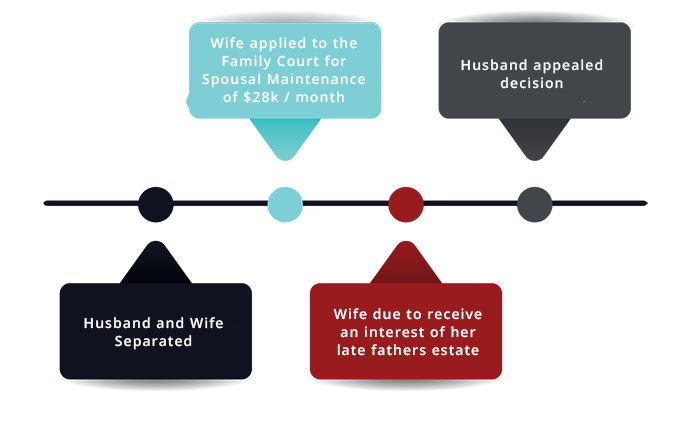Hall v Hall and the meaning of ‘financial resource’ and spousal maintenance.
Recently the High Court of Australia determined the case of Hall v Hall [2016] HCA 23 concerning a dispute over the payment of spousal maintenance. We will have a look at what a ‘financial resource’ is and whether no knowledge of that entitlement can impact a claim for spousal maintenance.
What does the Family Law Act say?

The Family Law Act 1975 sets out two criteria that need to be met for the payment of Spousal Maintenance.
Under the Family Law Act 1975, a party to a marriage is entitled to the payment of spousal maintenance from their ex-partner if they are unable to adequately and independently support themselves.[1] For this to occur two criteria must be met:
- The person must show evidence that they are unable to support themselves independently (i.e. a need for resources); and
- The other person must have the financial capability to meet these financial needs.
In making this order, a court will have regard to the applicant’s:
- Age;
- Health;
- Income;
- Ability to gain employment;
- Availability of financial resources;
- Care of any children under 18; and
- Other relevant circumstances.[2]
Essentially, the intention is to allow the Court to make orders that enable both parties to adequately support themselves and any minors.[3]
So what happened in this case?

What happened between Mr and Mrs Hall.
A husband (a property developer) and wife (medical practitioner) separated, with the wife submitting an application to the Family Court for interim spousal maintenance of $28,000 per month, based on her current needs and to assist with the children’s school fee payment. Whilst the wife’s financial statement disclosed an interest in her late father’s estate, she did not have knowledge of the particulars of the benefit, nor a copy of the Will.
The wife was successful in her application for spousal maintenance, but the husband appealed the decision.
It was later revealed that the wife was entitled to a payment of $16.5 million (providing she was 60 years old and separated from her husband) and an annual payment $150,000 until the lump sum was claimed. The wife alleges she was not aware of the entitlement. She argued that her lack of knowledge meant that this entitlement should not be classified as a ‘financial resource’.
The issues
- Whether the financial interest acquired by the wife can be classified as a ‘financial resource’ under the Family Law Act; and
- Whether the interim order for payment of spousal maintenance to the wife should be overturned based on the new evidence.
What is a financial resource?
A financial resource is something other than property that may have a future financial benefit to one or both parties. Whilst the definition of a financial resource is not provided by legislation, it can include a beneficial interest under a discretionary trust or inheritance. However, the law states that a financial resource does not include the expectation that one will benefit from the Will of a person who is still alive.
What did the High Court conclude?

The High Court found that the entitlement should be classified as a ‘financial resource’, as it was directly relevant to the wife’s ability to support herself.
The High Court found that the entitlement should be classified as a ‘financial resource’, as it was directly relevant to her ability to support herself. Despite the fact the wife made no claim to the entitlement, she was able to claim the benefit and could rely on the payment to support herself. The case determined that a ‘financial resource was “a source of financial support which a party can reasonably expect will be available…to supply a financial need or deficiency.”
Important lessons
- Spousal maintenance is not an automatic right and specific criteria must be met.
- A future benefit or ‘financial resource’ may be taken into account when making family law decisions, such as property settlements and interim orders for spousal maintenance.
- A Court must be satisfied that the applicant party is unable to support themselves independently and that the other party has capacity to provide spousal maintenance.
- The Court will make orders that are just and equitable, ensuring the circumstances of parties are taken into account.
[1] Family Law Act 1975 s 72(1).

